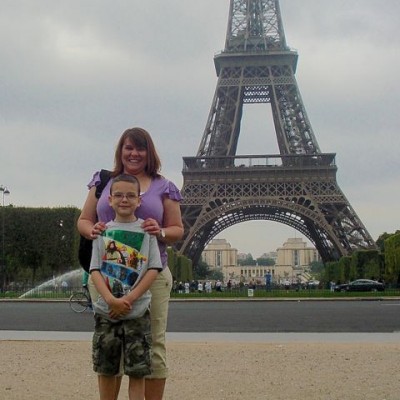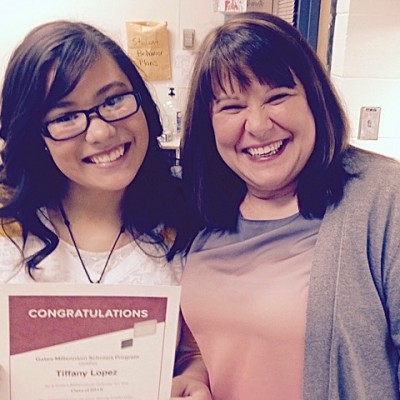“Teaching is so much more than just imparting knowledge and skills. It is the nurturing of young adults, helping them to grow and discover who they are.”
Laura Niemczyk is a teacher at Nikiski Middle/High School. She is mentor to 2015 Gates Scholarship Winner Tiffany Lopez and attended the Spring 2014 Talk Story, Write Story workshop in Homer.
2015 Reflection on Gates Scholarship Application Experience
Back in August the Gates Millennium Scholarship January deadline seemed far away, as though there was plenty of time to get my two students from first drafts to polished, powerful narratives for all eight essays. I had a timeline for drafts; a daily 30-minute writing block and a class of six hand-picked students, including the two who qualified for the GMS.
I was excited, full of energy and confident I could successfully handle this added responsibility on my already crowded plate. The fact that I had never done this before and that there would be a learning curve didn’t dissuade me; in fact, it didn’t even occur to me!
In August, my two potential Gates Scholars were both on board, excited and ready to work. Then the reality of being seniors with challenging academic loads, jobs, and life caught up with them. My role became that of a taskmaster reminding, encouraging, and nagging them to finish their drafts and to keep writing. By early October, it was apparent that one of the girls was not serious about it. I continued to push her but I couldn’t work harder than she did, so I focused more on Tiffany, who was willing to do the “heavy lifting” as Tad puts it.
Tiffany drafted. I critiqued and revised and asked her to dig deeper. Tiffany sent drafts off to Tad and Dean—some in decent shape, some a complete mess. The feedback we received from these early drafts was vital. There was a Skype call with Tad, Dean and myself in October that was critical. Tad reminded me that I knew how to write my story and that I could help Tiffany to tell hers. I needed the confidence boost along with the pointers for what steps to take with Tiffany’s essays. Tad took what I thought of as essay 5 and made it essay 3 and sent Tiffany, and me back to the starting block for the leadership essay. While that was tough to hear, that Skype call was rejuvenating and got me pumped to keep going.
I forfeited sleep to revise 2nd and 3rd drafts. I compassionately badgered Tiffany to tell a story, stick to the facts, remove her emotions from heartbreakingly personal situations. I listened when she needed to vent, wiped tears when she cried, and helped her develop a plan to cope and thrive when her home life continued to deteriorate. I repeatedly told her what an amazing young lady she was. She spent many Sunday evenings in my kitchen drafting and revising.
My timeline was tossed out and that was okay. Tiffany made constant forward progress; I realized that was good enough. Do I wish she had completed drafts sooner? Sure, but life didn’t always allow for that. There are times I felt guilty for not getting notes and revisions back to Tiffany quicker. I had to realize that that was okay, too. We both knew we were not in this process alone. Having the support of Tad and Dean along with their revision notes and edits was essential to ensuring that Tiffany produced the strongest application she could.
We both cried when she pressed the submit button uploading her application. We were both proud of the work she had produced.
August now seems long ago, and I’m exhausted, but I’m still excited. I am far more invested in Tiffany than I ever imagined I would be. I have become a better writing teacher because of this experience. I have become a better teacher, period.
If I had known the amount of work, time, and emotional involvement the GMS required from me, I’m not sure I would have undertaken the task. Now I cannot imagine not having done it. Watching Tiffany decide that she deserves to go to college and have a future has been incredibly rewarding and made the last four months worthwhile.
I have already started my list of possible GMS students for next year!
Why I Am a Teacher
My grandmother was a teacher in a one-room schoolhouse in rural Wisconsin. I remember being fascinated by the stories she told about the incidents, pranks, successes and challenges she faced. I also recall thinking that someone would have to be crazy to want to teach for a living. Teaching is not one of the various careers I imagined, daydreamed about, or considered until I met Curtis Kelley. He is the catalyst that lead me to teaching.
When I was nine years old, I lived in a suburb of Chicago. My father is a Marine (retired these days) and we moved frequently, often once or twice a year. My mother was a big believer that my two brothers and I needed to experience all that we could of each place we lived. With the city being a short train or car ride away, Chicago offered a wealth of activities, sights, and experiences to be had. A favorite day trip was to the Lincoln Park Zoo in Chicago’s north side. My parents had “adopted” a polar bear there for me as a Christmas present and I loved going to the zoo whenever I could to visit “my” bear. It was for this reason that my mom, my brothers, my grandmother (the former teacher) and I were at the zoo that weekend in March.
Although I am sure we had a great day, what I remember most about that trip happened after we left the zoo. The zoo’s parking lot was across the street from the main entrance. Chicago’s north side was just beginning the re-gentrification process—it was still quite seedy, especially after dark. As we slowly walked towards our car, I noticed two African-American teenagers next to the driver’s side door. One of the teens opened the door and slid behind the wheel. At this point I started screaming for help. My mother ran towards the vehicle as the teen behind the wheel started the ignition. It had taken the two boys less than a minute to unlock and hotwire the car!
All of my screaming spooked one of the boys and he ran off. My screaming had also attracted the attention of two graduate students and several on-lookers. All of this added attention spooked the teen behind the wheel. He tried to reverse, stalled the car, jumped out and ran off. The grad students pursued him for about a block before attracting the attention of a patrolling police car. Once the police joined the chase, the teen was easily caught. His name was Curtis Kelley and he was only 16 years old.
Over the next few weeks as we went through the judicial process, the assistant district attorney shared many things with me about Curtis Kelley. He lived in Cabrini Green, a housing project known for gangs, drugs, prostitution, and domestic violence. He had been a member of local gang since he was 10 years old. There was no father listed on his birth certificate and his mother was a drug addict who had been arrested for prostitution multiple times. He dropped out of school in 8th grade—not that his attendance had ever been great. For all intents and purposes he did not have anyone who looked out for him, loved him, or took care of him except for his fellow gang members. His rap sheet or arrest record was a mile long and he had been in and out of Juvie since he was 11.
Curtis Kelley did not appear for his scheduled court date. The only people who seemed surprised by that were my mother and me. Kelley knew the forfeiture of bail would be the only real consequence to his failure to appear. Although he was extremely street savvy knowing how to manipulate the system, the system eventually caught up with him, and he was arrested two years later for another offense and eventually died in jail at the age of 22 from a drug overdose.
In the days after the attempted car theft, I became fixated with one aspect of Kelley’s life. I could not understand how he could drop out of school. I could not get over the fact that there was no one who cared if he received an education or cared that he was not in class. This was my ah-ha moment in learning that education and schools are not equal everywhere. It was at this moment that I knew I would become a teacher. The type of teacher who would care about the Curtis Kelley’s of the world.
One truth that the certification process failed to teach me is that the daily grind of teaching is hard. And it is hard. It is hard to find and maintain the balance necessary for when to push a student and when to back off. It is hard to not internalize and take home their sorrows and their triumphs. Occasionally it is hard to refrain from laughing at their teenage angst or to not give in to the exasperation they can inspire.
Teaching is so much more than just imparting knowledge and skills. It is the nurturing of young adults, helping them to grow and discover who they are. Don’t get me wrong, I want all of my students to grow as writers and develop a love for life long learning. I also want them to develop their critical thinking and problem solving skills. But most of all, I want them to feel included, cared about and to know they are important and treasured to someone.



